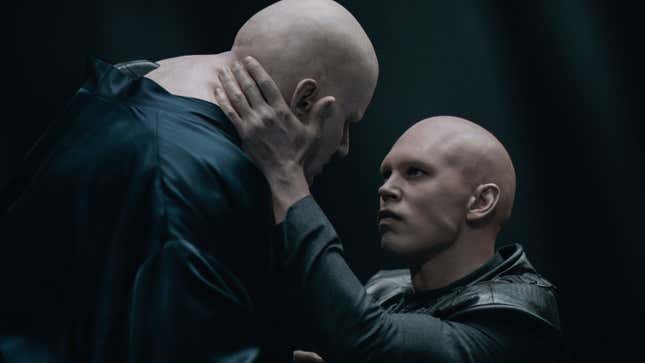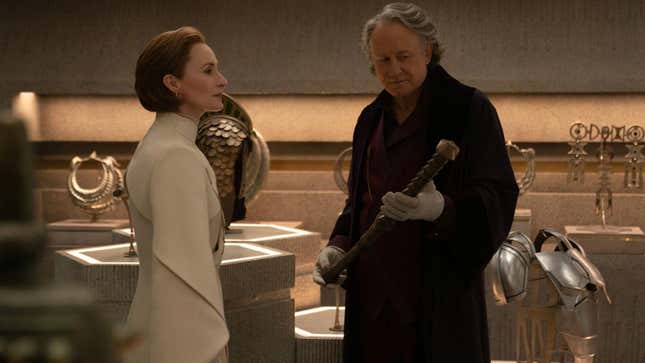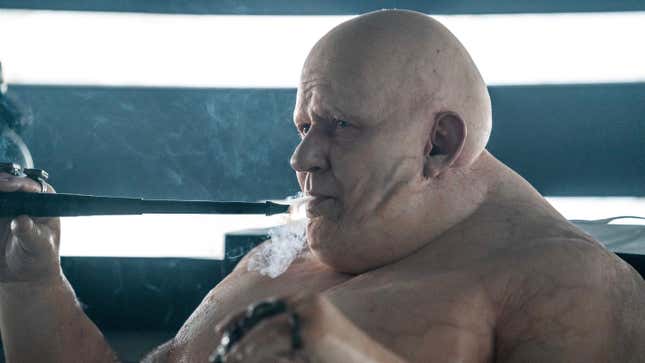Stellan Skarsgård has always been a talented, well-respected actor, but the last few years have put him into a whole other stratosphere, especially in sci-fi. For starters, he’s the game-changing Star Wars hero Luthen Rael on Andor. As Erik Selvig, he helped Thor across multiple Marvel movies. He danced across Greece in the Mamma Mia movies (not technically sci-fi but we love them anyway), and watched as four of his kids became successful actors, two of whom (Alexander and Bill) have become icons themselves.
Oh, and Skarsgård also stars as the gruesome, evil, gargantuan villain Baron Harkonnen in Denis Villeneuve’s Dune: Part One, and now Dune: Part Two, out on Friday.
Speaking to io9, the legendary actor discussed preparing to come back to the world of Dune, how Villeneuve is different from all the other filmmakers he’s worked with, his acting family, Andor, and if a seasoned veteran like himself can tell if a movie he’s in is any good or not.

Germain Lussier, io9: So I just talked to Dave [Bautista] a few minutes ago and I asked him what it was like working with you in full costume and makeup. He basically said you went through hell and everyone was very respectful of that. Would you agree with that description?
Stellan Skarsgård: I went through hell, yeah. But it was a very friendly hell. It took eight hours of five people working on me in the morning and they were lovely friends of mine. And there were some of the best people in the business, prosthetics. So I had a great time at the same time.
io9: Okay, good. Glad to hear that. Were you ever worried, or did you ever think, that Part Two would not happen? Because obviously, it was a gamble when Denis and Warner Bros. made the first one.
Skarsgård: I don’t think I had it in my mind because I know he’s a fantastic filmmaker, Denis. And he has loved this project [for a] very long [time]. He’s carried it since his childhood. So the first one would be good, then if it would be a commercial success—we don’t know. And Warner Brothers made a big mistake because they released it on streaming at the same time as in the theaters.
io9: Well, thankfully, everybody gets to see this one in the theater. And they’re going to see a Baron pretty set in his ways. Was there anything you were excited to explore with the character this time that you didn’t get in Part One?
Skarsgård: Well, in Part Two he’s a handicapped man and he’s trying to find some succession in the business. But I didn’t really make a psychological character the way you do sometimes. I mean, I don’t deal with the finer psychology of him. He’s supposed to be a mystery to some point and to be menacing. And you don’t know why.
io9: Over your career, you worked with so many incredible filmmakers. What makes Denis Villeneuve different or unique, as a filmmaker, having worked with so many people in this business?
Skarsgård: Good filmmakers, they are unique because they’re unique people. And they’re all different. Different characters, different temperaments. And Denis has a very lovely and sweet temperament, and it’s a nice set to be on. There’s nobody screaming and everybody’s professional. They do what they have to do. And you have a lot of fun making the film. He’s joking. And he also is creating on the set. He doesn’t sort of fill in the blanks that he’s decided at his desk or something.

io9: I will come back to Dune but I’m a Star Wars nerd and Andor is incredible. Luthen Rael is instantly a top-tier Star Wars character. And I know you can’t say much, or anything, about what’s happening next—but I wanted to know, what was the experience like filming the second season? And are you satisfied with where the story takes you?
Skarsgård: I’m satisfied where it goes, yeah. It’s such good writing and it’s Tony Gilroy. I really like to say his lines.
io9: Oh I can only imagine. Thank you. Back to Dune, the Baron doesn’t really get to see many of the other actors in the films until the ending of this one. Tell me a bit about shooting that big throne room scene with so many of the main cast.
Skarsgård: Well, if I hadn’t been so fat, I would have thought it was fun. But it was fantastic to see those people for the first time. Most of them I hadn’t seen during the two films. So it was very good.
io9: And obviously you got a very important moment with Mr. Chalamet at the end of there. What was it like figuring that scene out and going for that?
Skarsgård: That was fine. I mean, the only thing I had with him and the first time I see him, he’s [SPOILER REDACTED]. I don’t have a very nice experience.

io9: Speaking of, tell me a little about the goo. What is it like? Do they have a temperature setting? Is it just cold and miserable? What can you say about it?
Skarsgård: They make sure that it’s warm enough for you. But it was kind of colder than the air temperature because it was very hot in the summer and in Budapest at that time. So it felt good. I didn’t have to have my cooling apparatus on. But it’s not really oil—it is water and gelatin, I think. And then it’s some oil that is black on top of it. And I do not dare ask what’s in it. I’ve done it.
io9: Now, if I’m flipping through the channels and I see Good Will Hunting, I’ll always watch it to the end, no matter where it is. It’s an incredible movie and you’re great in it. And you’ve been in so many incredible movies like that. If you see something that you’ve been in, on TV or something, do you watch it or can you watch it?
Skarsgård: I mean, after 20, 30 years, I sort of watch it usually, but I don’t particularly like to watch myself. It’s not that I have something against it, but I’m too critical and I sort of say, “Oh, fuck, I could have done that, that could have been much lighter.” I’m too critical.
io9: Are you like that with your family too? Because several of them are becoming massive stars in their own right. Are you critical? Is there pride? What’s it like watching them?
Skarsgård: I don’t know. I mean, I can’t… I’m really happy that, I mean, I think I have four or five of them [who] are actors now.
io9: [Laughs] Yes.
Skarsgård: But I’m really happy when I meet people in the business and they say that they were nice to work with. Then I feel really proud. But sort of, success in the industry? It’s not that important.
io9: Having experienced that success though, I’m curious, at what point do you know if a movie is good or not? Is there ever a moment in the process when you can tell if a certain project is working or not?
Skarsgård: Who knows? I mean, you can’t know. Sometimes you read a script and say, “This is good.” Like Breaking the Waves I read and I said, “This is good. This is magic.” And then you can trust [director] Lars von Trier to make something out of it that is acceptable. But you can’t tell if it’s going to be a success at the box office or anything. Or critically. You can’t tell. But you can say “This interests me.” And that’s all I can say about the things that I’m in. And you can be interested in it for different reasons, too. Because it’s a film that has never been made before, and you find it very interesting, and maybe no one will see it—but it’s fun to be a part of.
io9: Very cool. And this is my last thing. I have a prop here. I don’t know if you’re aware that Lego made the first-ever Dune set. Have you seen any of this?
Skarsgård: No.
io9: [Hands over photo] This is your figure on the far right.
Skarsgård: [Laughs]
io9: I was just curious if you’d seen it because everyone is loving the Long Baron.
Skarsgård: Yes, I like him very much. He stands out.
Watch the Baron stand out in Dune: Part Two, out Friday.
Want more io9 news? Check out when to expect the latest Marvel, Star Wars, and Star Trek releases, what’s next for the DC Universe on film and TV, and everything you need to know about the future of Doctor Who.


















+ There are no comments
Add yours